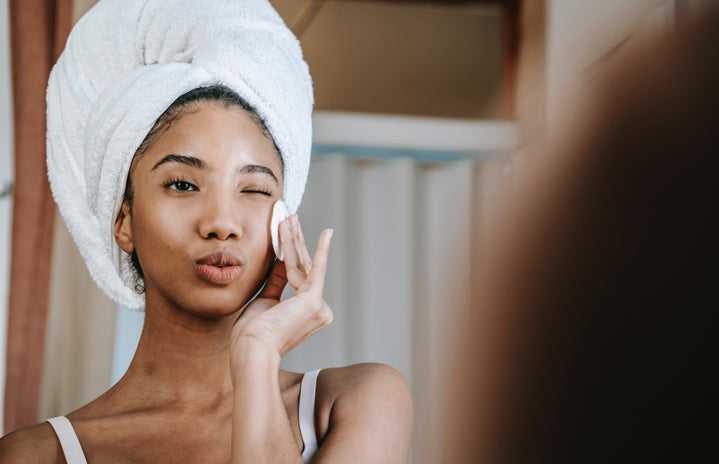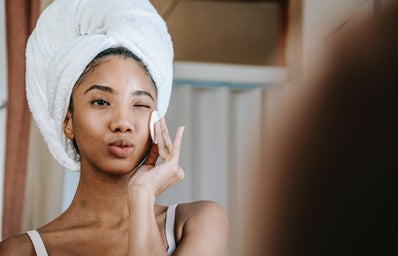Have you ever looked back at an old photo and said, ‘what was I thinking?’.
This feeling of regret now has a concrete label – a ‘glow up’. But what does ‘glowing up’ really mean?
I have taken to the most credible source one can find for internet lingo, Urban Dictionary.
To go from the bottom to the top to the point of disbelief. An incredible transformation.
Wow she really did glow up. From ugly duckling to gorgeous swan!!
‘Glowing up’ therefore places emphasis on making changes to become the best version of yourself. This can be taken very positively, where gradual changes are made to contribute to a better lifestyle. Unfortunately, the ‘glow up’ trends that currently circulate the internet seem to insist that these changes must be physical, advocating for the pressure to change yourself to fit into society’s standard of beauty.
Perhaps everybody partakes in a version of a ‘glow up’ through puberty. Inevitably, your body changes shape and you start to develop your own personality which, in turn, impacts your sense of self and style. And often these changes are quite dramatic, which can be seen in sayings such as ‘Wow, puberty hit her like a truck’. These developments in puberty fill out your adult body, so it is only natural that you become more conventionally and sexually attractive after this change.
‘Glow-up’ culture is extremely prevalent on social media as millennials and gen z have grown up in the midst of ‘glow-up’ challenges, weight loss transformation videos, and before and after pics. Different versions of the same trend constantly find their way back to being popular, such as Twitter’s #gloupchallenge, musical.ly’s ‘Don’t Judge Me Challenge’ and more recently TikTok’s ‘Just Wait Till I Glow Up’ challenge.
A majority of teen movies or rom-coms feed into the idea of a physical transformation. Some examples include huge franchises like The Princess Diaries or even Spiderman, where swapping glasses for contacts and dressing more conventionally acceptable suddenly impacts the rest of the events of the film. This concept is most definitely not exclusive to women; however, this cliché often showcases a female protagonist suddenly becoming a threat to the popular girl, being noticed by everyone when she used to fade into the background and having her long-term crush realize her true beauty, only after she has changed the way she looks. These movies preach that you cannot reach this conclusion without changing physical aspects of yourself to please other people.
Families such as the Kardashians/Jenners, who have been in the public eye since a very young age, have also undergone dramatic physical changes. We must remember that ‘glow-ups’ are not always a natural occurrence and that there are many artificial ways to transform our appearances. When features which we recognize on our own body are cosmetically changed to look drastically different, we become influenced to feel that our own features are ugly and inadequate. Not only children, but adult stars are also undergoing these major transformations. For celebrities such as Ariana Grande and Bella Hadid who are role models to so many, it’s hard to decipher what is a natural change and what is a cosmetic procedure. Through the documentation of these changes within the media, extreme transformations have become normalized so much that we constantly put pressure on our own selves to achieve an unrealistic level of beauty.
Clearly ‘glow-up’ culture has had a big impact on our generation, so how can we reclaim ‘glow-ups’ positively?
Maybe physical ‘glow-ups’ actually rely on mental ‘glow-ups’. Unless the want to improve comes from within, the physical changes won’t be sustainable and will act as a quick fix to cover a larger, underlying problem.
Social media appears to put a large price tag on the ability to feel good and brands are able to capitalize off our insecurities. Celebrities have huge teams of stylists to ensure they are always looking flawless at any angle and are always on trend. It’s important to remember that it’s normal to not look like this idealized version of ourselves that has taken hours of effort and money to perfect.
I often joke with my friends that retail therapy is the best form of self-care, and honestly buying nice clothes and getting beauty treatments can really improve your self-esteem. But to ‘glow-up’ and sustain these feelings, it could be beneficial to put effort into improving other aspects of our lives so that we do not become hyper-fixated on the physical. Budgeting and saving could result in a financial ‘glow-up’, journalling or reading could help to positively improve your mindset, and eating healthier or exercising could make you feel stronger and more awake. If your acceptance is solely based on external changes, then this external love will only be a continuation of being insecure.
How can you have a true ‘glow-up’ if you cannot accept every version of yourself? Even the one that loves eating chocolate in bed with no makeup on.


